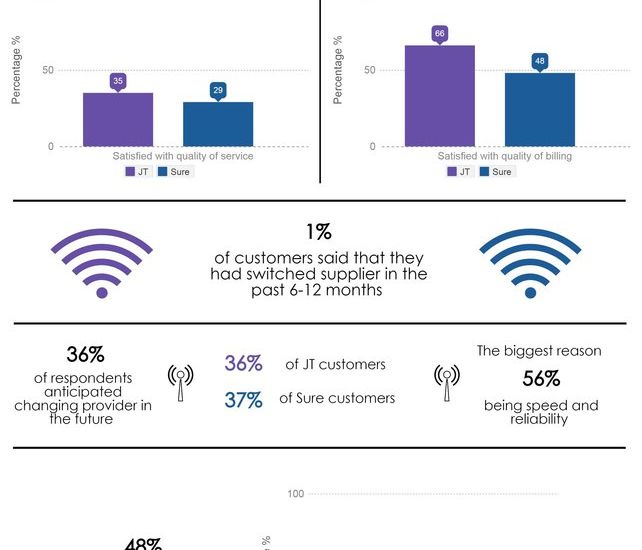

The Channel Islands Competition and Regulatory Authorities (CICRA) has released the results of its independent survey of customer satisfaction with broadband service providers JT and Sure.
CICRA commissioned Island Analysis to conduct the survey of 500 islanders in Guernsey and Jersey respectively which asked customers to give their opinion on the quality of service, billing and the level of customer service they had received from the two operators.
Guernsey headline results:
• Overall only 31% of respondents rated their broadband quality of service as satisfactory or highly satisfactory. Scores varied between operators with JT achieving 35% and Sure achieving 29%
• 51% of respondents rated their billing as satisfactory or highly satisfactory, with JT achieving 66% and Sure 48%
• Just under half (48%) of those surveyed had cause to contact customer services in the past six–12 months with 33% reporting their experience to be either dissatisfactory or very dissatisfactory
• While only 1% of those surveyed had changed provider in the past six-12 months 36% of respondents suggested that they would be likely or very likely to change provider in the future with most citing broadband speed and reliability (56%) as the reason to change
ICRA director, Louise Read, said: “There are significant differences in the scores achieved by the different operators with JT scoring slightly higher than Sure for quality of service and achieving significantly better results in its billing.
“We encourage operators to use the results of the survey to identify areas where they may need to improve to better meet their customers’ needs. We also hope that customers will use this report to inform their choices when it comes to broadband service providers and the services they choose.”
Following a successful pilot study in conjunction with Commerce and Employment, CICRA is in the process of commissioning a larger independent study into broadband quality of service across both Guernsey and Jersey which will provide a firm indication of factors that reduce broadband quality. This will indicate the reasons for any poor quality of service, which could include network issues or issues with the way customers have chosen to configure their broadband services within their own property.
“Focussing on the operators’ networks is only one part of the story and while we are keen to see operators strive to deliver improved services there are steps that customers can take themselves to improve their broadband experience. These include updating web browsers and virus scanning devices, securing wireless networks so you are not unknowingly sharing your connection with others and limiting the number of devices and applications that are ‘online’ at any one point in time,” she said.
This is the last in the series of three reports that CICRA has issued with the first report on fixed lines published in July and the second report on mobile telecoms services published mid-August. In response to requests from both consumers and operators CICRA will conduct the survey bi-annually with the next survey scheduled for November.